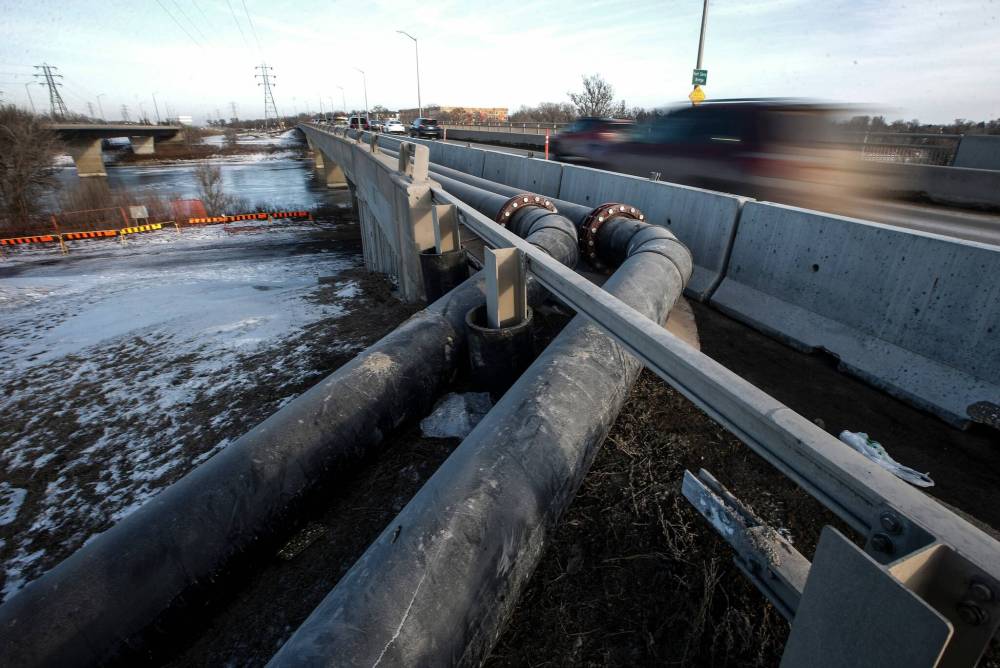Two more First Nations sue three levels of government for treating Red, Assiniboine rivers ‘as part of the sewage system’
Advertisement
Read this article for free:
or
Already have an account? Log in here »
To continue reading, please subscribe:
Monthly Digital Subscription
$0 for the first 4 weeks*
- Enjoy unlimited reading on winnipegfreepress.com
- Read the E-Edition, our digital replica newspaper
- Access News Break, our award-winning app
- Play interactive puzzles
*No charge for 4 weeks then price increases to the regular rate of $19.00 plus GST every four weeks. Offer available to new and qualified returning subscribers only. Cancel any time.
Monthly Digital Subscription
$4.75/week*
- Enjoy unlimited reading on winnipegfreepress.com
- Read the E-Edition, our digital replica newspaper
- Access News Break, our award-winning app
- Play interactive puzzles
*Billed as $19 plus GST every four weeks. Cancel any time.
To continue reading, please subscribe:
Add Free Press access to your Brandon Sun subscription for only an additional
$1 for the first 4 weeks*
*Your next subscription payment will increase by $1.00 and you will be charged $16.99 plus GST for four weeks. After four weeks, your payment will increase to $23.99 plus GST every four weeks.
Read unlimited articles for free today:
or
Already have an account? Log in here »
Hey there, time traveller!
This article was published 27/05/2024 (548 days ago), so information in it may no longer be current.
Two Manitoba First Nations have added their names to a list of Indigenous communities suing the City of Winnipeg, the province and the federal government, claiming $1 billion in damages for sewage discharges they say have tainted Lake Winnipeg.
Chief Roland Hamilton of Bloodvein First Nation and Chief Lawrence Letander of Dauphin River are named as plaintiffs in the documents that claim the defendants have infringed on their traditional ways of life by “treating the Red River and Assiniboine River as part of the sewage system.”
“This claim seeks to address the impacts of the pollution of Lake Winnipeg as a result of wastewater, including raw sewage, released by the city into the river system,” reads a lawsuit filed May 21 in Court of King’s Bench.

“Historically, the plaintiff First Nations supported themselves… by hunting, fishing, trapping and gathering, all of which rely upon adequate quantities of unpolluted fresh water from Lake Winnipeg.”
The document says the province has failed to enforce environmental standards in Winnipeg for decades, while the federal government has restricted the ability of affected First Nations to “exercise jurisdiction over the land and water on reserves.”
It cites a February sewage spill in which a burst pipe in Winnipeg spilled 230 million litres of raw wastewater into the Red River.
The Indigenous leaders are each seeking $500 million on behalf of their First Nations, along with other damages.
They are also calling on the court to impose a permanent injunction requiring the defendants to immediately construct infrastructure to halt sewage discharge into the Red and Assiniboine rivers.
The lawsuit joins a separate claim filed against the same defendants earlier this month. That suit includes eight First Nations seeking a collective $4 billion in compensation for similar allegations.
Both lawsuits allege oral and written promises made during the signing of First Nations treaties vowed to protect Lake Winnipeg, the river systems that empty into it and the surrounding lands.
Lake Winnipeg is the 10th largest freshwater lake in the world, according to the provincial government.
The city and province each said they cannot comment on pending litigation.
tyler.searle@freepress.mb.ca

Tyler Searle is a multimedia producer who writes for the Free Press’s city desk. A graduate of Red River College Polytechnic’s creative communications program, he wrote for the Stonewall Teulon Tribune, Selkirk Record and Express Weekly News before joining the paper in 2022. Read more about Tyler.
Every piece of reporting Tyler produces is reviewed by an editing team before it is posted online or published in print — part of the Free Press‘s tradition, since 1872, of producing reliable independent journalism. Read more about Free Press’s history and mandate, and learn how our newsroom operates.
Our newsroom depends on a growing audience of readers to power our journalism. If you are not a paid reader, please consider becoming a subscriber.
Our newsroom depends on its audience of readers to power our journalism. Thank you for your support.
History
Updated on Tuesday, May 28, 2024 1:25 PM CDT: Removes reference to Indigenous Services Canada






